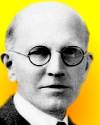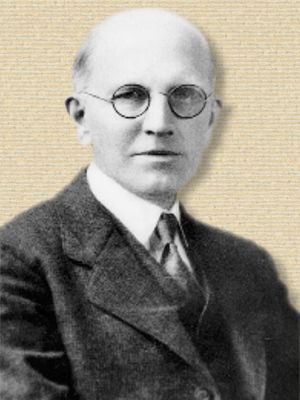 (source)
(source)
|
John Wesley Young
(17 Nov 1879 - 17 Feb 1932)
American mathematician interests included geometry, group theory, fundamental concepts of mathematics, and history of mathematics. With Oswald Veblen, he created a set of postulates for projective geometry, to simplify much of geometry. In 1910, they co-authored Projective Geometry, which covered their postulates.
|
Science Quotes by John Wesley Young (6 quotes)
A mathematical science is any body of propositions which is capable of an abstract formulation and arrangement in such a way that every proposition of the set after a certain one is a formal logical consequence of some or all the preceding propositions. Mathematics consists of all such mathematical sciences.
— John Wesley Young
In Lectures on Fundamental Concepts of Algebra and Geometry (1911), 222.
If we consider the nature of a deductive proof, we recognize at once that there must be a hypothesis. It is clear, then, that the starting point of any mathematical science must be a set of one or more propositions which remain entirely unproved. This is essential: without it a vicious circle is unavoidable.
— John Wesley Young
In Lectures on Fundamental Concepts of Algebra and Geometry (1911), 3.
It is clear that the chief end of mathematical study must be to make the pupil think.
— John Wesley Young
In Lectures on Fundamental Concepts of Algebra and Geometry (1911), 4.
Mathematical instruction, in this as well as in other countries, is laboring under a burden of century-old tradition. Especially is this so with reference to the teaching of geometry. Our texts in this subject are still patterned more or less closely after the model of Euclid, who wrote over two thousand years ago, and whose text, moreover, was not intended for the use of boys and girls, but for mature men.
— John Wesley Young
In Lectures on Fundamental Concepts of Algebra and Geometry (1911), 5.
The development of abstract methods during the past few years has given mathematics a new and vital principle which furnishes the most powerful instrument for exhibiting the essential unity of all its branches.
— John Wesley Young
In Lectures on Fundamental Concepts of Algebra and Geometry (1911), 225.
What is mathematics? To give a satisfactory definition is difficult, if not impossible.
— John Wesley Young
In Lectures on Fundamental Concepts of Algebra and Geometry (1911), 1.
See also:
- Projective Geometry, by Oswald Veblen and John Wesley Young. - book suggestion.

 In science it often happens that scientists say, 'You know that's a really good argument; my position is mistaken,' and then they would actually change their minds and you never hear that old view from them again. They really do it. It doesn't happen as often as it should, because scientists are human and change is sometimes painful. But it happens every day. I cannot recall the last time something like that happened in politics or religion.
(1987) --
In science it often happens that scientists say, 'You know that's a really good argument; my position is mistaken,' and then they would actually change their minds and you never hear that old view from them again. They really do it. It doesn't happen as often as it should, because scientists are human and change is sometimes painful. But it happens every day. I cannot recall the last time something like that happened in politics or religion.
(1987) -- 


